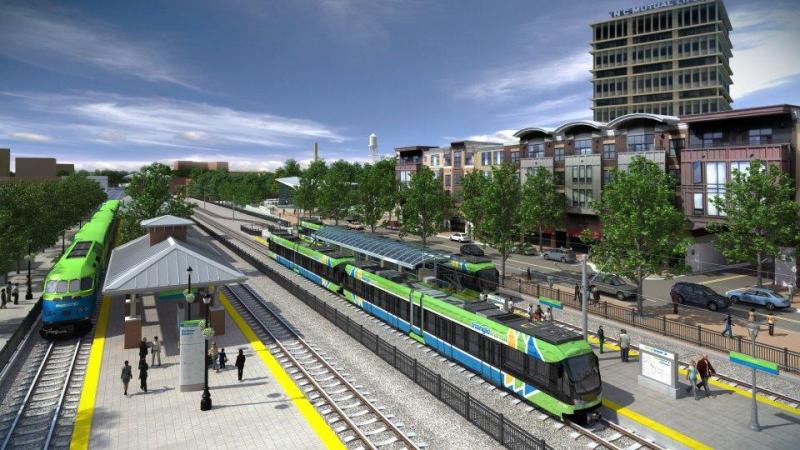Scores of Duke University faculty members are demanding that the institution abandon its threat to kill a 17-mile light rail line linking UNC-Chapel Hill, Duke, downtown Durham and N.C. Central University
Duke's Board of Trustees will vote on Thursday whether to allow construction of the $3.3-billion Durham-Orange light rail line to continue through campus. A negative vote would cause the long-planned project to miss a federal deadline, likely sinking it. This week, 51 faculty and staff members signed an open letter in the student newspaper, the Chronicle, demanding support for the transit project — especially given that the university claims it is committed to combatting climate change.
"The university has a plan to become carbon neutral and one of the areas that [need] the most progress is transportation, with all the employees driving to work," Earth Sciences Professor Drew Shindell, one of the letter signers, told Streetsblog. "This is a way to really tackle the problem."
The News Observer chronicled Duke's long, evolving list of mostly petty objections to the 17.7-mile light rail project. The paper noted that Duke has put "one hurdle after another in the path of light rail," including concerns about traffic, alleged tree damage and even protecting views of an on-campus golf course.
Project leaders from the light rail agency GoTriangle say they have worked hard to meet the university half way. For example, to quiet concerns Duke officials had about electric power connections with Duke Medical Center, GoTriangle added a $90-million elevated portion for the light rail.
But despite regional planning meetings going to 2015, Duke President Vincent Price told the News Observer that he had too many concerns to move forward. University officials claim construction and operation of the light rail line will cause vibrations that will impair operations at Duke Medical Center.
The University wanted a $1 billion insurance policy against that possibility. Now, they university is asking for a $2 billion insurance policy against light rail vibrations interfering with hospital operations.
Duke's Public Affairs office did not respond to Streetsblog's request for comment.
Shindell, whose research focuses on the air quality and climate impacts of power generation and transportation decisions, said he doesn't have any inside information about why the university is impeding the project. But he thinks University leadership is intensely focused on the everyday minutia of managing various facilities.
"Their job is not to pay attention to the big picture," Shindell said. "Duke says they care about the community and says they care about the environment and yet they throw out all these road blocks at the last minute to something everyone in the community says they want.
"It would be a hugely beneficial thing to our whole region," he added. "People are constantly locked in traffic jams on I-40 and it’s just going to get worse all the time."






